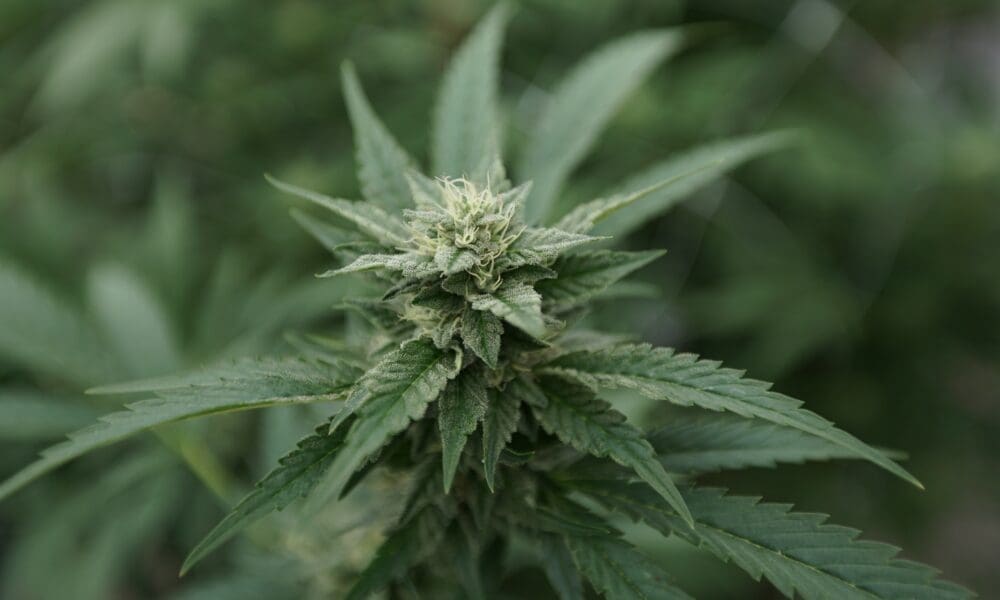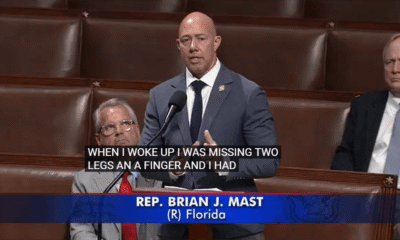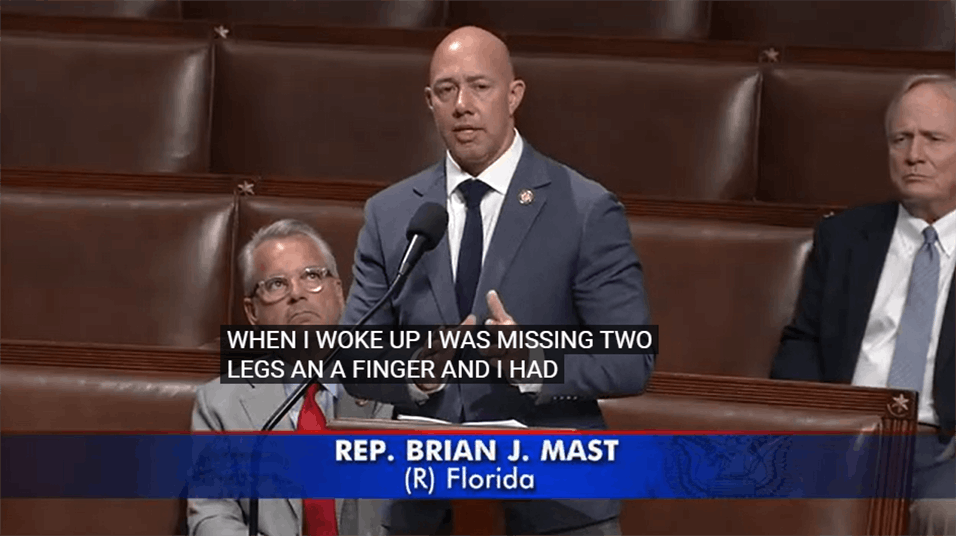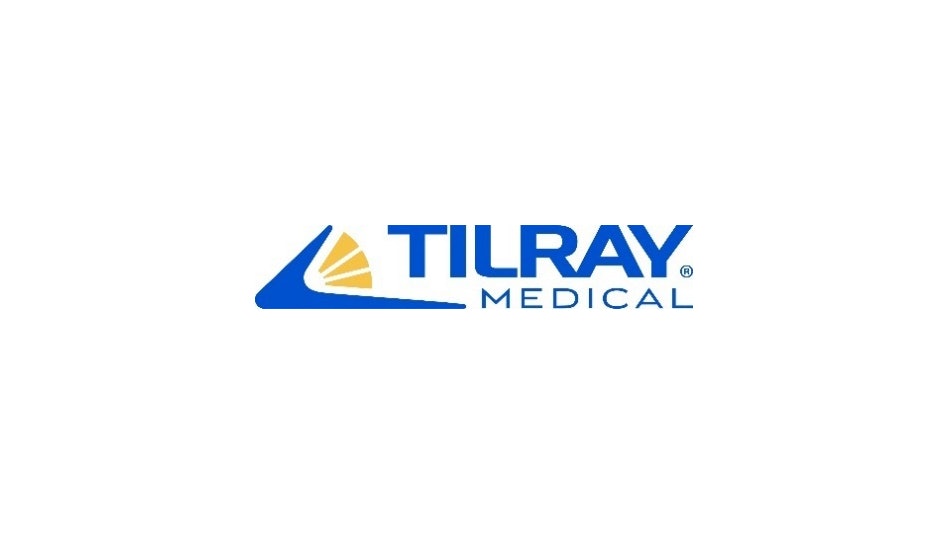featured
Delaware Bill To Loosen Local Restrictions On Marijuana Business Zoning Heads To Governor, But Will He Sign It?
Published
5 hours agoon

“This bill is critical to the success of the recreational marijuana industry due to the inability of licensees to find locations to operate.”
By Briana Hill, Spotlight Delaware
The battle over marijuana shop locations in Delaware may be ending, after state lawmakers approved a bill that opens the door for the businesses to operate in more places across the state.
The bill now awaits a signature from Gov. Matt Meyer (D) before it would become law, but it’s unclear how he will act.
Meyer’s office did not respond to requests Thursday for comment on whether he would sign or veto the bill. The former county executive had openly supported marijuana legalization efforts in recent years, but the legislative debate on Senate Bill 75 really centers on a question of whether state government should overrule local decision-making.
“This sets an ugly precedent for overriding county ordinances,” Rep. Valerie Jones Giltner (R-Georgetown) said during the floor vote of the House of Representatives.
But proponents, such as House Majority Whip Ed Osienski (D-Newark), say the marijuana industry will only succeed if businesses can find suitable places.
“This bill is critical to the success of the recreational marijuana industry due to the inability of licensees to find locations to operate,” Osienki said during Wednesday’s House floor vote.
Senate Bill 75, sponsored by Osienski and Sen. Trey Paradee (D-Dover), would override county-level zoning laws that dictate how far marijuana dispensaries must be from sensitive places like schools, libraries, and treatment centers—reducing the buffer to no more than 500 feet.
The bill also requires that existing medical marijuana businesses that were granted conversion licenses to become retail stores be allowed to continue operating in their current locations, even if local zoning laws change in the future.
Municipal bans have proliferated
In recent weeks as lawmakers debated the bill, state regulators prepared for the rollout of the recreational adult-use cannabis industry. During that time, marijuana licensees have noted that they have little space to set up their businesses.
State lawmakers legalized the recreational marijuana industry in 2023. As part of that law, municipalities are allowed to ban marijuana establishments, while counties can set restrictions on where they can operate.
Since 2023, at least 19 of Delaware’s 57 municipalities have passed bans on marijuana-related stores within their town limits, making it difficult for some operators to find a space to locate. The small town of Camden in Kent County joined them this month.
The 125 cannabis business owners who were awarded licenses late last year are only allowed to operate in one of Delaware’s three counties. New Castle has 59 licenses, while Sussex has 41 and Kent has only 25.
Sussex County, where more than half of the municipalities have outlawed such businesses, has also set the widest buffers between shops and sensitive areas at 3,000 feet.
New Castle County – which has a majority of the state’s residents – currently has its buffer set at 1,000 feet.
Issue among ‘home rule’ debates
In recent weeks, the bill has been part of a “home rule” debate in Delaware – along with other pieces of legislation that local officials say undermine counties’ rights to govern land use issues. As part of the debate, all three county governments have passed resolutions urging the General Assembly to “defer and respect the principle of local governance.”
Earlier this month, the Delaware League of Local Governance, an organization that represents counties, cities, and towns across the state, sent a letter to the General Assembly, urging lawmakers to protect and reaffirm the authority of municipalities in zoning and land-use decisions.
Among those who signed the letter were Sussex County Council President Doug Hudson, Kent County Levy Court Commissioner Jeff Hall, and Dover Mayor Robin Christiansen.
The issue was also raised by Jones Giltner during the House meeting, who argued that the local governments know how to make such decisions from a holistic view, keeping the needs of their residents in mind.
But Osienski emphasized that the state passed similar proposals in the past, highlighting the 1971 passage of the Coastal Zone Act and the Quality of Life Act, which passed in 1988.
The bill passed 25-8, with only one Democrat representative, Sherae’a Moore, voting against the measure.
Despite the bill’s passage through both chambers, Sussex County officials say they remain hopeful that Gov. Meyer will veto the legislation.
“The County Council, in joining the other two counties by adopting a resolution, has made clear its position on this and other ‘local control’ bills under consideration in this year’s General Assembly session. That viewpoint remains: that a heavy-handed, top-down approach to managing land use from Dover, rather than in our municipalities and counties, threatens to erode each community’s voice across the state,” County Council officials said in a statement to Spotlight Delaware.
Sussex County Councilman Steve McCarron said that as a result of the bill, marijuana businesses are likely to start appearing just outside municipal borders, and could end up being associated with those towns regardless.
While he opposes the bill, McCarron noted that municipalities might need to revisit their local laws to consider allowing dispensaries within town limits. By doing so, they could charge business license fees and generate revenue to support public safety and law enforcement.
If the bill becomes law, Osienksi says he hopes marijuana retailers will demonstrate they can be good neighbors, encouraging communities to be more open to allowing additional dispensaries in their area.
“Over time, people have realized this is a good thing,” he said.
This story was first published by Spotlight Delaware.
Delaware Lawmaker Withdraws Bill To Regulate Hemp-Derived THC Drinks
Photo courtesy of Chris Wallis // Side Pocket Images.

Author: mscannabiz.com
MScannaBIZ for all you Mississippi Cannabis News and Information.
You may like
-


Raids and bans on marijuana in Alabama causes a Decatur smoke shop to struggle
-


Nebraska Judge Rejects Lawsuit Seeking To Overturn Medical Marijuana Law Approved By Voters
-


BREAKING: Court tosses lawsuit on Nebraska medical cannabis ruling
-


New York state expands cannabis recall
-


US Lawmaker Who Lost Limbs in War Convinces House to Allow Veteran Access to Cannabis
-


Tilray Medical Publishes Pioneering Research on Pharmacokinetics of THC, CBD Formulations
featured
Nebraska Judge Rejects Lawsuit Seeking To Overturn Medical Marijuana Law Approved By Voters
Published
10 hours agoon
June 28, 2025
“It is much too late to stop the secretary of state from putting the medical cannabis initiatives on the ballot.”
By Zach Wendling, Nebraska Examiner
A Lancaster County District Court judge has dismissed a lawsuit seeking to void Nebraska’s medical cannabis laws on the grounds that they violate federal laws against marijuana.
Lancaster County District Judge Susan Strong, in a 16-page opinion Thursday, ruled that John Kuehn, a former state senator and longtime marijuana opponent, could not prove injury to sue, the legal term of art known as “standing.”
Strong, citing past case law, said such injury would need to be “concrete,” “distinct and palpable” and “actual or imminent.”
“Plaintiff admits that he has not suffered an injury-in-fact resulting from defendants’ actions, and the court finds that he lacks standing under any of the exceptions to the rule requiring an injury-in-fact,” Strong wrote.
Instead, Kuehn sought to get his foot in the courthouse door arguing that any Nebraskan should be able to challenge ballot measures (even after an election), that he has standing as a taxpayer to prevent the “illegal expenditure” of public funds and that he should have standing because the laws constitute a “matter of great public concern.”
Strong ruled against Kuehn on all three points.
More than 71 percent of Nebraskans approved legalizing medical cannabis, and 67 percent approved a regulatory system.
On the election-related challenge, Strong said Kuehn isn’t challenging the legal sufficiency of a ballot measure. Strong ruled over a separate Kuehn case last fall where she upheld the legality of the measures to legalize and regulate medical cannabis after Kuehn, and later top state officials, accused campaign workers of fraud and malfeasance. She rejected those claims.
“It is much too late to stop the secretary of state from putting the medical cannabis initiatives on the ballot,” Strong wrote.
Nebraska Supreme Court appeal pending
Kuehn had targeted Secretary of State Bob Evnen (R) and the trio of ballot sponsors of the 2024 medical cannabis campaign in the earlier case and again added them to this one.
Despite being a defendant, Evnen and his state attorneys, including Nebraska Attorney General Mike Hilgers (R), all but embraced Kuehn’s arguments and sought to overturn Evnen’s placing of the ballot measures on the 2024 ballot just months before.
That earlier case, Kuehn v. Evnen et al., heads to the Nebraska Supreme Court this fall on appeals from Kuehn and Evnen.
This time around, Kuehn also targeted Gov. Jim Pillen (R), initially seeking to stop the governor from ceremoniously declaring the ballot measures successful. Strong did not let Kuehn do so, and Pillen certified the new laws, effective December 12.
In January, Kuehn added CEO Steve Corsi of the Nebraska Department of Health and Human Services, State Treasurer Tom Briese, Tax Commissioner Jim Kamm and the members of the Nebraska Medical Cannabis Commission that voters overwhelmingly approved creating in November to regulate the medication.
Among Kuehn’s main contentions in the federal preemption case was that Nebraska shouldn’t be able to create a medical cannabis program because of federal law classifying marijuana as a Schedule I drug. A Schedule I drug is one that the federal government says has a high potential for abuse and no accepted medical uses. A bipartisan swath of advocates has called for rescheduling the drug for decades.
Nearly 40 states, including Nebraska, have laws on the books for medical cannabis.
‘A clear message’
Crista Eggers, executive director of Nebraskans for Medical Marijuana, one of the three ballot sponsors targeted in the Kuehn cases, said she appreciated Strong’s “thoughtful decision.” She said the ruling “should send a clear message to the opposition that they have lost.”
Eggers said Strong’s dismissal upholds many years of hard work and hints “that we will finally see the day that we, and all Nebraskans, have fought for.”
Daniel Gutman, who represented the ballot sponsors in both Kuehn cases before Strong, said her order was consistent with other dismissals nationwide on procedural and substantive grounds.
“This is yet another failed attempt to undermine the will of Nebraska voters,” Gutman said in a statement.
The AG’s Office, representing all state defendants except for the Medical Cannabis Commission members, as well as a separate attorney representing the commission, declined to comment on the dismissal.
Kuehn’s attorneys did not respond to a request for comment.
An ‘exception’ vs. a ‘rule’
Strong called Kuehn’s allegations of “taxpayer standing” “remarkably broad,” ranging from allegations that Briese or Kamm would illegally be expending funds by collecting sales taxes on medical cannabis or by issuing guidance or investigating complaints against doctors who recommend cannabis. Medical cannabis would be sales tax exempt under current law. DHHS had not issued guidance or investigated complaints as of earlier this week.
Strong did say that Kuehn’s “strongest case” for taxpayer standing is against the commission itself, though Strong she noted none of the members are compensated for their duties and that the voter-approved laws did not give specific funds to the Medical Cannabis Commission.
The Legislature set aside an additional $30,000 in spending authority for Liquor Control Commission employees who might take on joint duties with medical cannabis regulations. Strong’s ruling noted that the new state budget didn’t earmark any specific funding for the Medical Cannabis Commission.
Strong said that if “employee time” was enough for taxpayer standing, it would no longer be an “exception,” which attorneys for the Medical Cannabis Commission and ballot sponsors had argued.
“It would be the rule anytime a statute requires a government employee to do anything,” Strong wrote. “That result would be inconsistent with the principle that ‘[e]xceptions to the rule of standing must be carefully applied in order to prevent the exceptions from swallowing the rule.’”
On standing for a “matter of great public concern,” Strong said it’s unclear whether the Nebraska Supreme Court has applied the exception since it was created in 1979.
“If the proliferation of gambling and harm to the state’s natural resources are not matters of great public concern, then the court is hard-pressed to say that the legalization and regulation of medical cannabis is,” Strong wrote, citing cases from 2000 and 2015.
No shortage of ‘strong political opinions’
Strong said it is also relevant that other people could challenge the medical cannabis laws in court, one of which she said “obviously” is the federal government to enforce the federal Controlled Substances Act.
Others could sue, too, such as a landowner near a registered cannabis establishment if property valuation, use or enjoyment is impaired or someone fined by the Medical Cannabis Commission, Strong said.
Another party that has voiced intentions to sue if establishment licensing begins by an October 1 deadline, as required under law, is the Nebraska Attorney General’s Office. Hilgers and his staff, including in this case, have repeatedly said they plan to sue if licensing begins, part of why his office supported dismissing Kuehn’s latest case.
Strong said she does not decide in the present lawsuit whether Hilgers and his office would have standing to challenge the medical cannabis laws.
“Nebraska, like other states, has no shortage of citizen-taxpayers with strong political opinions. That is not necessarily a bad thing,” Strong wrote. “But it would be bad if all those citizens could sue whenever a law requires a government employee to do something.”
This story was first published by Nebraska Examiner.
Nebraska Medical Marijuana Regulators Approve Emergency Rules Banning Flower Access For Patients

Author: mscannabiz.com
MScannaBIZ for all you Mississippi Cannabis News and Information.
featured
US Lawmaker Who Lost Limbs in War Convinces House to Allow Veteran Access to Cannabis
Published
18 hours agoon
June 27, 2025
Before being elected to Congress, U.S. House Rep. Brian Mast, R-Fla., was unconscious for more than a week in 2010, when he woke up missing two legs and a finger at Walter Reed Medical Center in Bethesda, Md.
The U.S. Army veteran was deployed to Afghanistan, where a roadside improvised explosive device (IED) in Kandahar resulted in catastrophic injuries during his work as a bomb disposal expert under the Joint Special Operations Command.
Mast recounted his experience as a double-leg amputee while introducing an amendment June 25 on the U.S. House floor.
“What I woke up to was being on a laundry list of medications,” he said. “I had an epidural. I had oral morphines and oxys. I had antidepressants, anti-inflammatories, heavy sleep sedatives. I had a Dilaudid drip and a number of other things that I can’t even remember to this point—all at once. I had not been on any of these things before in my life.”
Mast provided his testimony as a support mechanism to allow military veterans access to medical cannabis. He and Rep. Dave Joyce, R-Ohio, who co-chair the Congressional Cannabis Caucus, were successful on June 25 in attaching an amendment via a voice vote to the Military Construction, Veterans Affairs, and Related Agencies (MilCon-VA) Appropriations Act for fiscal year 2026.
The amendment would authorize the Department of Veterans Affairs (VA) to provide recommendations to veterans to participate in state-licensed medical cannabis programs.
“My father was wounded, left for dead in World War II, and he came home,” Joyce said on the House floor. “I know what it takes for these people and the hurt that they’ve gone through on behalf of their country, and they deserve every option available to bring them back to what they were before they left on our behalf.”
The GOP-controlled House passed the underlying appropriations legislation in a 218-206 vote with two Democrats joining the majority. The bill would provide more than $152 billion in overall discretionary spending and $300 billion for mandatory programs, fully funding veterans’ medical care at $131.4 billion, according to the House Appropriations Committee.
While the bill wouldn’t fund medical cannabis care, Mast’s amendment would authorize the VA to provide recommendations to veterans to participate in state-licensed medical cannabis programs.
While 40 states have legalized medical cannabis, federal law forbids the Veterans Health Administration (VHA) from completing forms or registering veterans for participation in state-sanctioned cannabis programs—most of which require a doctor’s recommendation and include post-traumatic stress disorder as a qualifying condition.
The VHA is the largest integrated health care system in the U.S., providing services to more than 9 million veterans at roughly 1,400 facilities nationwide.
Under the status quo, veterans often have to choose between their VA doctor and access to medical cannabis, and “that’s wrong,” Mast said.
After coming home from Afghanistan, Mast said he went through a gamut of withdrawal symptoms while coming off narcotics, from extreme irritability to extreme bowel movements and insomnia.
“The state that these narcotics—in many cases—leave our veterans [in] are at the most extreme end of it: states of suicide,” he said. “At other ends of it, just extreme states of dissatisfaction and lacking purpose in life. And, in some cases, it does leave them in a better condition. But the point I’m making with this true story is that veterans need to have options outside of these narcotics.”
While Mast introduced the Veterans Equal Access Act on Feb. 14, that standalone legislation has yet to receive a subcommittee hearing. By successfully attaching the nuts and bolts of the two-page legislation as an amendment to the MilCon-VA bill, Mast has bypassed the committee process and fast-tracked the underlying intent.
Specifically, the amendment states that none of the funds appropriated or otherwise made available to the VA may be used to enforce Veterans Health Directive 1315 as it relates to:
- The policy stating that “VHA providers are prohibited from completing forms or registering veterans for participation in a state-approved marijuana program”;
- The directive for the “Deputy Under Secretary for Health for Operations and Management” to ensure that “medical facility directors are aware that it is VHA policy for providers to assess veteran use of marijuana but providers are prohibited from recommending, making referrals to or completing paperwork for veteran participation in state marijuana programs”; and
- The directive for the “VA Medical Facility Director” to ensure that “VA facility staff are aware of the following” … “[t]he prohibition recommending, making referrals to or completing forms and registering veterans for participation in state-approved marijuana programs.”
“[Veterans] need to have the ability when they’re being seen by their primary care physician inside of the VA to have discussions about whether cannabis is or is not right for them,” Mast said. “They need to be able to talk to their medical provider about what they fill out on the paperwork, what is the right dosage amount, how that’s going to interact with any other medications that they might be on, how it might affect their blood pressure or other things going on with them personally.
“And if we’re not giving that option to have that conversation at the most serious level without worrying about some kind of reprisal for the doctor or otherwise, then we are doing our veterans a disservice.”
Should Mast’s amendment remain in the final enactment of the MilCon-VA Appropriations Act, it could have broader implications for federal reform.
Federally funded VA doctors providing recommendations or prescriptions for medical cannabis would add to cannabis rescheduling advocates’ argument that the plant has “currently accepted medical use” in the U.S. and, therefore, cannot be classified as a Schedule I drug under the Controlled Substances Act.
But that wasn’t on Mast’s mind during this Wednesday’s floor session.
“The fact of the matter is, while I have heard of many of my brothers and sisters in arms being in a state of suicide because of the narcotics they’ve been on, I’ve yet to hear about any of them attributing a state of suicide to the cannabis that they have had as a part of their life,” he said.

Author: mscannabiz.com
MScannaBIZ for all you Mississippi Cannabis News and Information.
featured
Tilray Medical Publishes Pioneering Research on Pharmacokinetics of THC, CBD Formulations
Published
19 hours agoon
June 27, 2025
[PRESS RELEASE] – NEW YORK, June 26, 2025 – Tilray Medical, a division of Tilray Brands Inc. and a global leader in medical cannabis, empowering the therapeutic alliance between patients and health care practitioners to make informed individualized health decisions, announced the publication of a scientific study. This new research focuses on comparing the bioavailability of different cannabinoid formulations, taking a step forward in the understanding of medical cannabis.
The study aimed to assess the pharmacokinetic parameters and relative bioavailability of two D9-tetrahydrocannabinol: cannabidiol (THC:CBD) formulations:
- an orally administered: Tilray THC:CBD extract; and
- an oromucosally administered nabiximols formulation.
This pilot crossover study counterbalanced:
- 1 mL of orally administered Tilray THC:CBD extract (10 mg/mL each of THC and CBD); and
- oromucosally administered nabiximols (four sprays of 2.7 mg THC and 2.5 mg CBD per spray, for a total dose of 10.8 mg THC and 10 mg CBD).
Blood samples were obtained pre-dose and at 16 post-dose time points over 24 hours. Pharmacokinetic parameters were calculated for THC, 11-hydroxy-tetrahydrocannabinol (11-OH-THC), and CBD.
Conducted with 12 healthy volunteers (six male, six female) under fasting conditions, the results revealed that the Cmax for THC and CBD was significantly higher for the Tilray THC:CBD extract compared to nabiximols, and neither Tmax nor AUC was significantly different for the two treatments. Interestingly, the Cmax for nabiximols was significantly higher in males compared to females. Under both treatment conditions, THC and CBD were undetectable 24 hours post-dose, and 11-OH-THC was markedly reduced from its peak. Notably, no serious adverse events were reported.
This pilot study shows that oral administration of Tilray THC:CBD extract formulation achieved higher THC and CBD concentrations within a shorter timeframe compared to the oromucosal delivery of nabiximols. These findings may have significant implications for clinical populations using these formulations therapeutically.
José Tempero, Tilray’s medical director, said, “By advancing our understanding of cannabinoid pharmacokinetics, we are better equipped to develop formulations that can significantly enhance therapeutic outcomes. We extend our heartfelt thanks to our partners in this study for their invaluable contributions and collaboration.”
Denise Faltishchek, chief strategy officer and head of International at Tilray, said, “This pioneering research exemplifies our commitment to advancing the science of medical cannabis. By deepening our understanding of cannabinoid pharmacokinetics, we strive to enhance the therapeutic potential of our products, ultimately improving the quality of life for patients globally. Our goal is to continue driving innovation and providing patients with safe, effective, consistent and reliable medical cannabis solutions for patients around the world.”
Tilray Medical is a leading provider of EU-GMP-certified and pharmaceutical-grade medical cannabis products, having supplied more than 20 countries with a comprehensive portfolio of THC and CBD products. Tilray has supported medical trials globally, across Europe, Canada, the United States, Australia, and Latin America, studying the efficacy of medical cannabis as a treatment for indications including pediatric epilepsy, refractory pediatric epilepsy, cancer-induced nausea and vomiting, HIV, essential tremor, breast cancer disorders, post-traumatic stress disorder and alcohol-use disorders.

Author: mscannabiz.com
MScannaBIZ for all you Mississippi Cannabis News and Information.

Delaware Bill To Loosen Local Restrictions On Marijuana Business Zoning Heads To Governor, But Will He Sign It?

Raids and bans on marijuana in Alabama causes a Decatur smoke shop to struggle

Nebraska Judge Rejects Lawsuit Seeking To Overturn Medical Marijuana Law Approved By Voters

BREAKING: Court tosses lawsuit on Nebraska medical cannabis ruling

New York state expands cannabis recall

US Lawmaker Who Lost Limbs in War Convinces House to Allow Veteran Access to Cannabis

Tilray Medical Publishes Pioneering Research on Pharmacokinetics of THC, CBD Formulations

Cannabis companies to sell products at some CT outdoor venues – NBC Connecticut

Aurora Expands Patient Access to Medical Cannabis in Canada With Extended Compassionate Pricing Program
Thailand starts banning the sale of cannabis without a prescription National Post

Trulieve Opening 162nd Florida Medical Cannabis Dispensary in Oakland Park

He Built a $800 Million Cannabis Business—Now He’s Tackling the Blue-Collar Tech Gap with AI

The best strains for dabbing

New Chicago Police Policy Discourages Searches Based On Marijuana Odor

Police say Port Barrington man, 77, had explicit video chat with child, offered pot for sex acts – Shaw Local

Thailand Takes U-Turn on Cannabis Decriminalization, Reinstalls Drug Penalties

First legal cannabis dispensary to open in Genesee County

Matt Gaetz Pictured Reviewing Contract To Provide Top Marijuana Company With ‘Administration-Related’ Support Amid Rescheduling Push
Thailand starts banning the sale of cannabis without a prescription

Fire products for fireworks, grilling & chilling this July 4th weekend

AYR Wellness Has No Estimate for Q1 2025 Interim Filings; Trading Remains on Hold

Thailand starts banning the sale of cannabis without a prescription

Cannabis Seeds Launched To Orbit By SpaceX Crash Into Sea, Setting Back Mission To Grow Marijuana On Mars

Thailand starts banning the sale of cannabis without a prescription

Alert: Department of Cannabis Control updates data dashboards with full data for 2023

Connecticut Appoints The US’s First Cannabis Ombudsperson – Yes there is a pun in there and I’m Sure Erin Kirk Is Going To Hear It More Than Once!

5 best CBD creams of 2024 by Leafly

Free delta-9 gummies from Bay Smokes
New Study Analyzes the Effects of THCV, CBD on Weight Loss

EU initiative begins bid to open access to psychedelic therapies

Mississippi city official pleads guilty to selling fake CBD products

Curaleaf Start Process Of Getting Their Claws Into The UK’s National Health System – With Former MP (Resigned Today 30/5/24) As The Front Man

May 2024 Leafly HighLight: Pink Runtz strain

5 best autoflower seed banks of 2024 by Leafly

Horn Lake denies cannabis dispensary request to allow sale of drug paraphernalia and Sunday sales | News

Discover New York’s dankest cannabis brands [September 2024]

Press Release: CANNRA Calls for Farm Bill to Clarify Existing State Authority to Regulate Hemp Products

Nevada CCB to Accept Applications for Cannabis Establishments in White Pine County – “Only one cultivation and one production license will be awarded in White Pine County”

Local medical cannabis dispensary reacts to MSDH pulling Rapid Analytics License – WLBT

6 best CBD gummies of 2024 by Leafly

The Daily Hit: October 2, 2024

5 best THC drinks of 2024 by Leafly

5 best delta-9 THC gummies of 2024 by Leafly

Weekly Update: Monday, May 13, 2024 including, New Guide for Renewals & May Board meeting application deadline

People In This State Googled ‘Medical Marijuana’ The Most, Study Shows

Thailand: Pro-cannabis advocates rally ahead of the government’s plan to recriminalize the plant

PRESS RELEASE : Justice Department Submits Proposed Regulation to Reschedule Marijuana

Press Release: May 9, STIIIZY and Healing Urban Barrios hosted an Expungement Clinic & Second Chance Resource Fair
Trending
-

 California Cannabis Updates1 year ago
California Cannabis Updates1 year agoAlert: Department of Cannabis Control updates data dashboards with full data for 2023
-

 Breaking News1 year ago
Breaking News1 year agoConnecticut Appoints The US’s First Cannabis Ombudsperson – Yes there is a pun in there and I’m Sure Erin Kirk Is Going To Hear It More Than Once!
-

 best list11 months ago
best list11 months ago5 best CBD creams of 2024 by Leafly
-

 Bay Smokes12 months ago
Bay Smokes12 months agoFree delta-9 gummies from Bay Smokes
-

 cbd1 year ago
cbd1 year agoNew Study Analyzes the Effects of THCV, CBD on Weight Loss
-

 Business9 months ago
Business9 months agoEU initiative begins bid to open access to psychedelic therapies
-

 Mississippi Cannabis News1 year ago
Mississippi Cannabis News1 year agoMississippi city official pleads guilty to selling fake CBD products
-

 Breaking News1 year ago
Breaking News1 year agoCuraleaf Start Process Of Getting Their Claws Into The UK’s National Health System – With Former MP (Resigned Today 30/5/24) As The Front Man




